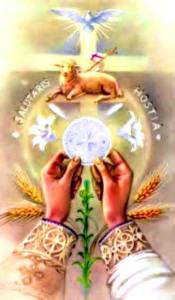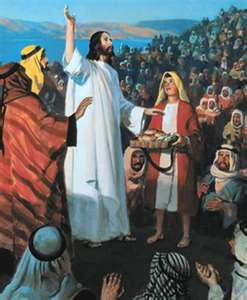(A biblical reflection on the Solemnity of CORPUS CHRISTI – Sunday, 29 May 2016)
Gospel Reading: Luke 9:11-17
First Reading: Genesis 14:18-20; Psalms: Psalm 110:1-4, Second Reading: 1 Corinthians 11:23-26
When the crowds learned it, they followed Him; and He welcomed them and spoke to them of the Kingdom of God, and cured those who had need of healing. Now the day began to wear away; and the twelve came and said to Him, “Send the crowd away, to go into the villages and country round about, to lodge and get provisions; for we are here in a lonely place.” But He said to them, “You give them something to eat.” They said, “We have no more than five loaves and two fish – unless we are to go and buy food for all these people.” For there were about five thousand men. And He said to His disciples, “make them sit down in companies, about fifty each.” And they did so, and made them all sit down. And taking the five loaves and the two fist he looked up to heaven, and blessed and broke them, and gave them to the disciples to set before the crowd. And all ate and were satisfied. And they took up what was left over, twelve baskets of broken pieces. (Luke 9:11-17 RSV)
Corpus Christi Sunday is a day when we celebrate Jesus’ goodness in feeding us through the Holy Eucharist.
Christianity is a belief (a set of beliefs) and not a theory. Granted there is a great deal of intellectual work involved in the Catholic-Christian story. For we understand theology to be faith seeking understanding (fides quaerens intellectum). However, we can never rest with mere intellectual constructions. To do so would reduce Christianity to a head-game. We could be very orthodox (correct beliefs) but still be deficient in orthopraxis (correct action). Christianity is a belief which demands costly grace and the willingness to be a disciple in the most ultimate ways of love. Jesus did not merely preach the Kingdom; He also ushered it in through His birth, death and resurrection. It is not those who say Lord, Lord, but those who do the will of the Father in heaven who are saved (Matthew 7:21)
The above discussion is very important for understanding of the Eucharist. We often hear it said, “I am going to receive the Eucharist.” Or we say, “I am going to church.” Some even say, “I am going to hear Mass.” There is something very passive and inactive about such phrases. For we are called to do more than just “receive” the Eucharist or “go” to church and “hear” Mass. We are to actively receive the Eucharist or “go” to church and “hear” Mass. We are to actively receive the Eucharist. We are to be Church and proclaim as well as hear the celebration of the Mass.
 The feast of Corpus Christi, the Body of Christ, is anything but a theory or some inactive dogma. All good dogmas and teaching are worthy of our active allegiance. They help us to know and do the truth. We believe that Jesus is really present in the Eucharist. We believe that the Eucharist is the food for eternal life. We believe that the Eucharist is the food which transforms us and changes our hearts of stone to hearts of flesh centered in Christ. Do we really believe this? Lord, help our disbelief. Help us to become more like the body of Christ we celebrate.
The feast of Corpus Christi, the Body of Christ, is anything but a theory or some inactive dogma. All good dogmas and teaching are worthy of our active allegiance. They help us to know and do the truth. We believe that Jesus is really present in the Eucharist. We believe that the Eucharist is the food for eternal life. We believe that the Eucharist is the food which transforms us and changes our hearts of stone to hearts of flesh centered in Christ. Do we really believe this? Lord, help our disbelief. Help us to become more like the body of Christ we celebrate.
How is this to be done? The words of Jesus in our Gospel reading are a good place to start! “Why do you not give them something to eat yourselves?” To be as well as to receive the Eucharist means involvement and care for others. This care is both spiritual and material. We do not live by bread alone (Matthew 4:4; Deuteronomy 8:3). Neither do we live without bread and the basic material necessities of life. It is not enough to say that we believe in the Eucharist and the real presence. To stop with a verbal affirmation would render the Eucharist a splendid theory. However, when we put the Eucharist into practice it becomes a genuine belief. When we clothe the naked and feed the hungry, make welcome the stranger and provide for homeless we show what we believe (see Matthew 25:31-46). When we share our beliefs about God in a way that is both confident and respectful, we mirror the example of Jesus. He refused to call down thunder on those who disagreed (Luke 9:51-56). He allowed those who found His teachings too hard to leave His company (John 6:66).
In conclusion, we must put into practice what we believe. We should observe the effects or fruits of a given belief in the lives of those who hold the belief. What do others observe in our lives? Are we a people of the Eucharist who believe that Jesus is really present and so really give thanks? Are we living reminders of the real presence of Jesus? Each time we come together to eat the bread, drink the cup and hear the word, do we proclaim the death of the Lord until He comes?
Prayer: Lord Jesus Christ, You gave Your Church an admirable sacrament as the abiding memorial of Your passion. Teach us so to worship the sacred mystery your Body and Blood, that its redeeming power may sanctify us always.
Jakarta, 27 May 2016
A Christian Pilgrim

No comments:
Post a Comment